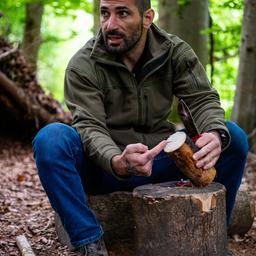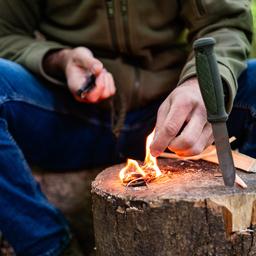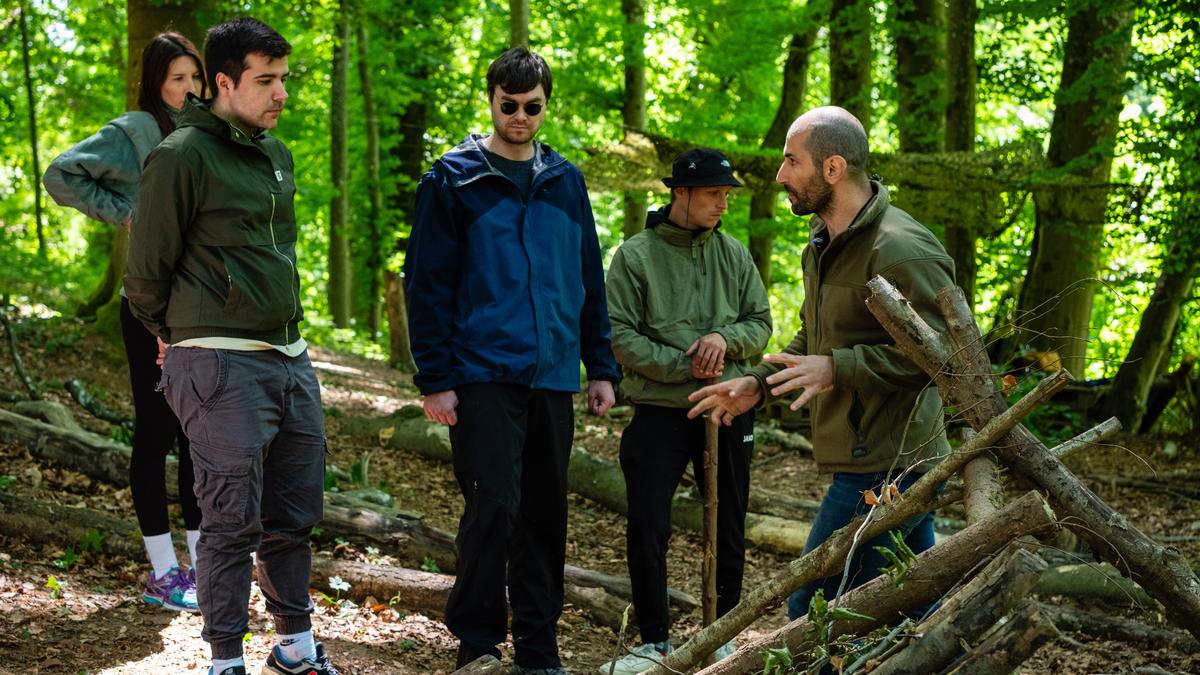Mondorf-les-Bains is known for its casino and spa, but it is also home to the Delta Survival School (DSS), which trains ordinary people what to do in emergency situations.
Zurab Tskitishvili, founder of the DSS and a former member of the Georgian special forces, for the past seven years has been sharing his technical knowledge and experience of hostile environments to help anyone deal with the unexpected.
Virgule took part in one of these training sessions, and survived. Well … almost.
Participants met in a car park a stone’s throw from the French-Luxembourg border. Zurab welcomed us and explained the day’s programme: understanding the items needed for a survival kit, how to build a shelter, how to make a fire and how to make a water filter.
We then set off into the forest. After a few minutes’ walk, we arrive at a camp that has already been set up. This will be the site of our initiation.
An ironclad mindset
But before getting to the heart of the matter, Zurab takes several minutes to explain the most important aspect in an emergency situation: the mindset. “That’s really the most important thing. You have to have the mindset to be able to absorb the shock of an emergency situation, adapt to the stress and then act,” he said.
When building a shelter, the choice of wood is very important © Photo credit: Laurent Sturm
Once the shelter structure has been created, it is covered with branches, then foliage © Photo credit: Laurent Sturm
When building a shelter, it’s all about the choice of wood © Photo credit: Laurent Sturm
“Panicking always leads to mistakes that can prove fatal. To develop this resilience, we need to get out of our comfort zone, whether through physical activity or otherwise. It doesn’t matter how well equipped you are, without the right mindset, you’re screwed.”
Then comes the practical part of building a shelter. We use only what nature has to offer: larger, sturdier pieces of wood make up the base structure of our shelter. “It has to be long enough to allow you to stretch out your whole body in it,” explains Zurab.
Once the frame is standing, we cover it as much as possible with branches. Among other things, these will serve as supports for the final stage. This involves covering the shelter with foliage, which is abundant on the ground.
The work is tedious, but little by little, the shelter is taking shape. “You really have to cover it up so that the light doesn’t get through,” explains Zurab. In just an hour, and after a lot of trouble to find the right pieces of wood, our shelter is now “habitable”. And the group is a little proud of our achievement.
Once the structure of the shelter has been created, it is covered with branches, then foliage © Photo credit: Laurent Sturm
Once the structure of the shelter has been created, it is covered with branches, then foliage © Photo credit: Laurent Sturm
Once the shelter structure has been created, it is covered with branches, then foliage © Photo credit: Laurent Sturm
Once the structure of the shelter has been created, it is covered with branches, then foliage © Photo credit: Laurent Sturm
But there’s no time to rest, as we move on to the next stage: building a fire. On paper, the task looks daunting. But Zurab, who is a great teacher, takes the time to give us some valuable advice. For example, on the different types of wood, how to cut it with a simple knife and separate the wet parts from the dry ones.
But also on how to start a fire, using small twigs or – useful if at hand – cotton pads, normally used for facial care. “These are filled with fibres that ignite very quickly,” Zurab explains.
Zurab explains how to make a fire using the right type of wood © Photo credit: Laurent Sturm
Zurab explains how to build a fire using the right type of wood © Photo credit: Laurent Sturm


With the flint in hand, we set about trying to light a small fire. It was a laborious task, with only a few sparks coming from the piece of rock. However, after a few unsuccessful attempts, red flames finally ignite in the wood. Another goal achieved under Zurab’s watchful eye.
After all that effort, we finally settle down around the fire. This is an opportunity to learn a little more about our instructor.
“I’m a former Georgian soldier. I left my country in February 2015 to come to Paris. It had always been my dream to share my survival skills with others. It’s something I’ve been passionate about since I was a kid, when I was already creating shelters in my garden,” he smiles. “What do I enjoy most? It’s the connection with people, you have to work as a team to achieve a common goal.”
Zurab Tskitishvili has been sharing his knowledge for seven years © Photo credit: Laurent Sturm
Seeing no opportunity to develop his business in France, he took the decision to cross the border and open Delta Survival School in February 2018. “Why Luxembourg? In particular because of its nature and its ideal location between the three countries of Germany, Belgium and France,” he explains.
Creating a water filter
The final stage of the day’s activities: making a water filter. Once again, we’ll be using whatever we can get our hands on. In other words, a cut-up water bottle in which to place stones and sand collected near a stream, and charcoal from the fire we’ve just made. “The charcoal absorbs chemical impurities, while the sand and stones retain solid particles,” explains the instructor.
It doesn’t take much to create a home-made water filter © Photo credit: S.MN.
No sooner said than done, and here we are with a perfectly functional home-made filter, with the proof to back it up. A cup of dirty water from a puddle is put into the bottle and the water comes out clear and clean. “But be careful: while the filter has removed the particles, it hasn’t killed micro-organisms such as bacteria. For that, you still need to boil the water or use water purification tablets.”
This is the end of the course.
Also read:What to do in Luxembourg in case of a power blackout
At a time when the Luxembourg authorities are urging the population to prepare for potential crises, Zurab’s says he has seen an increase in bookings since January 2025. “This coincides with the government’s statements recommending that people prepare an emergency kit in case of an emergency,” Zurab said.
However, he is keen to reassure those who might see these workshops as a kind of “instruction manual” before the apocalypse. “Some people saw this as a gathering of conspiracy theorists. It’s nothing of the sort. It’s just people who are curious or want to learn useful skills. But they’re not paranoid at all,” he said.
Things to have in an emergency kit
According to Zurab, you don’t need much to put together an emergency bag that can be carried quickly and easily. “The first thing that’s important is to be able to protect yourself, so I’d pack a small knife, which can also be used for many other purposes. Secondly, I’m thinking of a sleeping bag.”
Food comes third. “People underestimate the importance of water. So I take a few bottles with me, as well as a few energy bars. The bag should also contain medicines such as painkillers and bandages to dress wounds. We also need to think about communications, which could be cut off. So take a radio with you. It’s also very important to print out our identity documents and take them with us, also in electronic form with a small USB key,” concludes Zurab, who also recommends carrying a torch in the bag.
He also insists on not being too visible. “In the sense that the bag should be as neutral as possible: no big logos or flashy camouflage patterns. In the event of chaos, other people will inevitably think you’re carrying valuables.”
The Delta Survival School has reached far beyond the borders of Luxembourg and even the Greater Region, said Zurab. “I have customers from all over the world. A lot of them are French, but I’ve had participants from Antwerp, Lithuania and even Thailand. Most of the time, it’s just civilians looking to prepare themselves.”
Also read:Luxembourg trying to avoid ‘panic’ over emergency survival kits, PM says
Something for everyone
The course we attended is only part of the range offered by the former special forces officer. Zurab also offers much more intense training, such as an overnight immersion course. As well as the basics, he also teaches how to create animal traps, abseiling and first aid.
There are also firearms courses and camps for children. Finally, for the more adventurous, Zurab also offers an intensive two-day course based on the principle of SERE (Survival, Evasion, Resistance and Escape).
This is training in escape and survival techniques in very difficult conditions. Video extracts of these advanced training courses have reached several million views on the Delta Survival School social networks. After seven years, the school is about to undergo a re-brand under the name Allions, Zurab said.
For this journalist, the experience ends here, but not without having learnt a whole host of basic survival skills.
It’s hard not to feel a certain pride in all that has been learnt in just one day © Photo credit: Laurent Sturm
© Photo credit: Laurent Sturm
© Photo credit: Laurent Sturm
(This story was first published on Virgule. Translated using AI, edited by Cordula Schnuer.)
